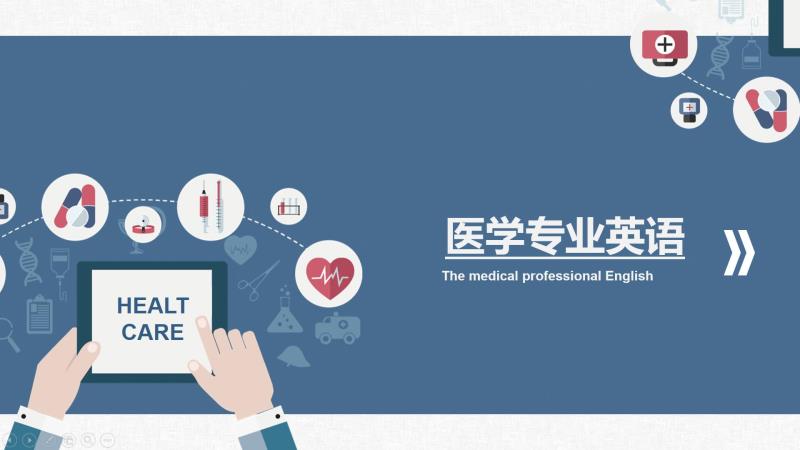
当前课程知识点:医学专业英语 > 4. Literature and Documents in Medical Sciences(医学专业不同类型文献及文件的分析) > Reading skills for Articles and Medical Journals(医学专业论文的基本阅读技巧) > Video
Hello everyone
Welcome to my class
I'm Cherry Chen
from Central South University
Welcome to this part
We are focusing on the last part
医学专业论文的基本阅读技巧
That is the reading skills
for medical articles
So we divide this part into five parts
from reading medical papers
the purpose and goals to
making use of tables and graphs
in comprehension
Now let's look at the first part
sample paper
for reading practice
This is our sample paper for this part
You will find some diagrams
some tables
and the picture in some outlined
or highlighted headings
Right
So reading medical
you have to ask yourself
why you want to read
this journal article
So before read the research article
make up your mind
about this following questions
like why do I read the paper
What am I reading now
Who are the authors
For example
are they the professionals
or are they the doctors
or are they from a famous research group
or research institute like that
And what a specific task
for your reading
Do you want to read
for the specific information or data
or do you want to read
for the methods they use
the approach they analysis
and want to make some comparisons
between this article and that article
the methods they used
in different articles
And also
whether are you reading for the ideas
of logical thoughts
for your own study
Or you want to review the article
So
before you read
you have to go through
the whole structure
focus on the contents
The contents is combined with
theme
results
methods
discussion
and a reference
And whether it is readable
that means
whether the sentence patterns
the variation
the length
the complexity
is good for you
is appropriate for you to understand
And also the words
whether the terms in it
the technical and the symbols
the data
the statistics
the expressions
do you think it's easy or it's
quite appropriate for you to read it
and to cover it
And also the drawing
that means the table
the graph
the flow chart
or whether they are appropriate
for you to understand
While you are reading this article
the journal article
focus on the contents
basically
or
especially on the methods
results and the discussion
And you can find this kind of information
from the factors
from the data
table or graph
and also in the reference part
But pay attention here
Do not read the article
for the language of the article
You focus on the ideas
okay
not on the language itself
So now let's analyze the journal paper
First we would find the title
And here is the title for this part
the sample
establishing a standard definition
for child overweight
or obesity worldwide
international survey
This is a survey
and the abstract part
should be objective
you would find the objective
that is the purpose of this article
and how it is designed
the setting and who are their subjects
and the main results
And then you will find the measure
That means what method they carried
and results and the conclusion
And sometimes you find
the introduction for the authors
their institutions
and their titles
even their address
so that you can connect with them
if you want
And for the subjects
you would find
a long sentence here
But in this part
you will find the subjects
For example
each survey
had over ten thousand subjects
with ages ranging
from six to eighteen years old
So this is the subjects
Right
And the part of results here
Figure two shows
And here down here you find
these show
the different extents of overweight
across data sets
reflecting national differences in fatness
So part of the articles are given
in the statement or description
of figures
So we have to make use
of the tables and graphs
to help us to understand this article
Look at the following table
It would be helpful
Right
Look at this table
It's about
six nationalities
representative
so different countries
here are the ages
And here you find the two line graphs
right
Line graphs in different countries
and their changes
their differences
Now let's look at the language features
The structure of the paper
is a report form
with instruction
subjects methods
results
discussion and conclusion
Basically
there are these parts
one two three
four five parts
And the first person is used
as the subject in statements like
our analysis provides
blah blah blah
And the third person is used
in analyzing the items
and describing the process
Here
It is not realistic to wait for them
because there is an urgent need
Okay
So the general principle
for paper reading
we have to follow these questions
If you want to read for breath
Ok
what did they do
Then you skim the introduction
head and graphs
definitions
conclusions
and bibliography even
And then you consider
the credibility
The credibility means whether
it is reasonable
reliable
and then how useful it is
and then decide whether
you want to go on
to continue to finish it
And then go in depth
再深度阅读
Ask yourself
how did they do it
the methods
And then challenge their argument
Do not always follow their ideas
You have to reflect
to reflect whether they are right
Do you have any different ideas
And exam the assumptions
examine their methods
even examine their statistics
examine reasoning and conclusion
and then ask yourself
how can I apply their approach
to my research work
So let's make a summary for this part
Paper reading
is not merely reading
in language comprehension
It is for the information
the methods
So you have to notice
the intention and purpose
of the reading
and the structure of the paper
and also the important ideas
facts
and data
And if you want
the language also can help you
to get this information
The language features can help you
to get the information
Here are the assignments
You read the sample paper again
try to make an outline of it
and compare yours with your classmates
And the second task
find a paper of for your possible
dissertation topic
and read and discuss your reading process
with your teacher
That's all for this part
Thank you for joining us
-Medicine,Language,English(英语在医学实践中的地位和应用特点)
-Medical English: features and learning strategies(医学专业英语的学习策略和方法)
--Video
-学习资源
-第一章 Medical English: Features and Learnin
-Word-building(构词)
--Video
-Word Analysis (prefixes and suffixes)(单词分析(前缀和后缀))
--Video
-The body and body parts
--Video
-Systems(系统)
--Video
-Pharmacology(药理)
--Video
-Etymology for medical terms (医学词语词源学的研究)
--Video
-Symbols and abbreviations in medical language(医学实用缩略语和常用医学符号)
--Video
-术语学习——访谈
--Video
-2.Medical Literacy and Terminology (专业术语
-Top-down skill in readings:frame and process(从整体到细节的阅读策略分析)
--Video
-Inferring and referring in reading process(推断和归纳在专业阅读中的运用)
--Video
-Making notes in your learnings(学会做学习的笔记)
--Video
-Making use of reading skills in your life (阅读的类型和技巧介绍)
--Video
-批判性思维——访谈
--Video
-学习资源
--学习资源
-Critical Reading Skills
-Reading Skills for Professional Medical Literature(医学专业文献的语言特点和阅读)
--Video
-Reading skills for paragraphs in Medical Papers(医学论文的段落写作特点和阅读)
--Video
-Reading skills for Articles and Medical Journals(医学专业论文的基本阅读技巧)
--Video
-科技类文献阅读
--Video
-Reading Skills for Medical Teaching Materials(医学专业教材的语言特点和阅读)
--Video
-医学专业文献阅读——访谈
--Video
-学习资源
--html
--html
-4.基础练习1
-4.基础练习2
-4.基础练习3
-Strategies and Techniques in Doctor-patient communicatin 1(医患沟通的策略与技巧 1)
--Video
-Strategies and Techniques in Doctor-patient communicatin 2(医患沟通的策略与技巧 2)
--Video
-Strategies and Techniques in Doctor-patient communicatin 3(医患沟通的策略与技巧 3)
--Video
-Strategies and Techniques in Doctor-patient communicatin 4(医患沟通的策略与技巧 4)
--Video
-Strategies and Techniques in Doctor-patient communicatin 5(医患沟通的策略与技巧 5)
--Video
-Strategies and Techniques in Doctor-patient communicatin 6(医患沟通的策略与技巧 6)
--Video
-Doctor‐patient Communication——访谈
--Video
-5.Communication in Clinic Medicines (医学临
-Medical translation practice: from English to Chinese(医学英语汉译实用策略分析)
--Video
-Translation of traditional Chinese medical literature to English(医学文献的中译英问题研究)
--Video
-Balance and features of Chinese and English cultures in medical communication(医学交流中汉、英语言文化特点的比较分析)
--Video
-Principles and approaches:medical translation(翻译问题: 基本原则和方法)
--Video
-翻译——访谈
--Video
-6.Balance Between Chinese and English: M
-Case History writing(案例历史写作)
--Video
-应用文写作——访谈
--Video
-学习资源
--学习资源
-general introduction to academic writing(学术写作的一般介绍)
--Video
-Proposal writing(提案写作)
--Video
-Abstract writing(摘要写作)
--Video
-The path and features of Medical academic writting 1(医学论文写作的路径和特点介绍 1)
--Video
-Writing of medical literature reviews(医学文献综述的写作)
--Video
-学术写作——访谈
--Video
-写作与学术写作
-communication and Medical Study(交流和医学研究)
--Video
-Attending Professional Medical Conferences(如何参加国际会议)
--Video
-Presenting in Professional Medical Conferences(在国际专业医学会议上的展示问题)
--Video
-Attending An Academic Conference——访谈
--Video
-9.communication and Medical Study--基础训练



